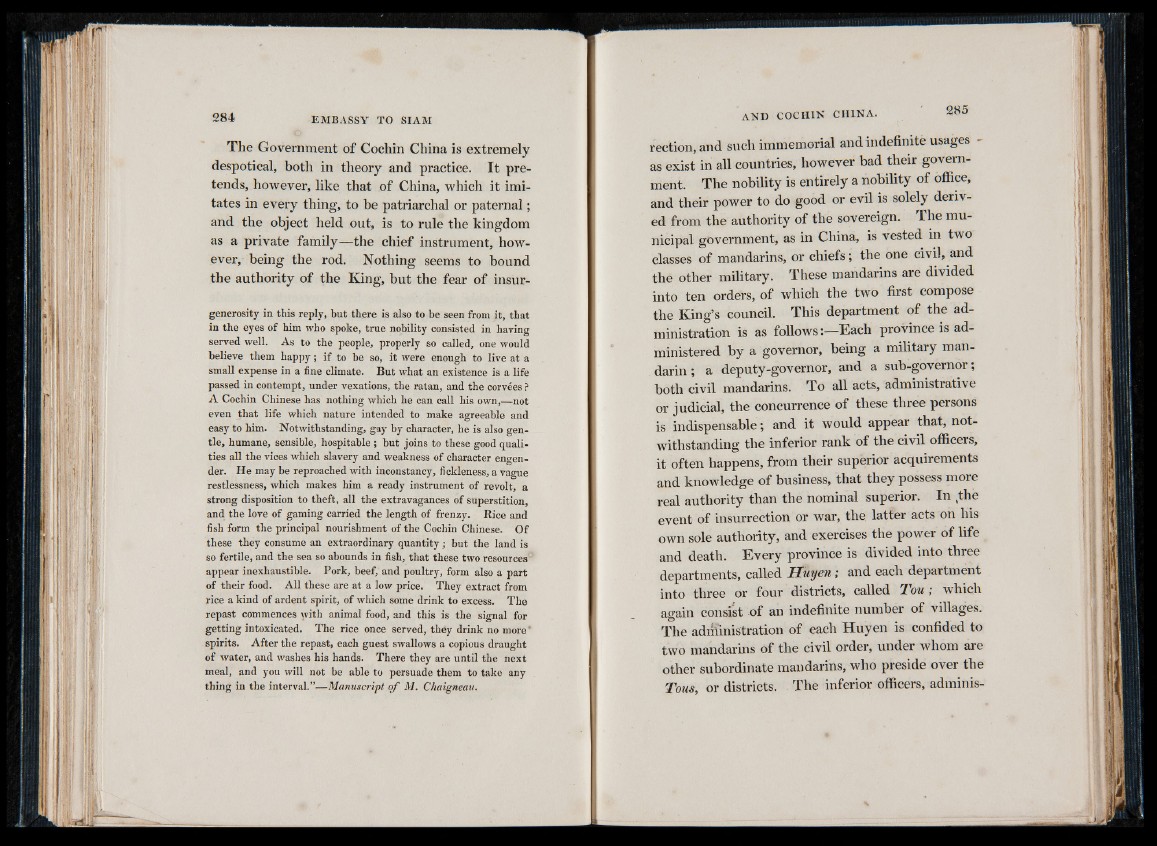
The Government of Cochin China is extremely
despotical, both in theory and practice. I t pretends,
however, like that of China, which it imitates
in every thing, to be patriarchal or paternal ;
and the object held out, is to rule the kingdom
as a private family—the chief instrument, however,
being the rod. Nothing seems to bound
the authority of the King, but the fear of insurgenerosity
in this reply, but there is also to be seen from it, that
in the eyes of him who spoke, true nobility consisted in having
served well. As to the people, properly so called, one would
believe them happy ; if to be so, it were enough to live at a
small expense in a fine climate. But what an existence is a life
passed in contempt, under vexations, the ratan, and the corvées ?
A Cochin Chinese has nothing which he can call his own,—not
even that life which nature intended to make agreeable and
easy to him. Notwithstanding, gay by character, he is also gentle,
humane, sensible, hospitable ; but joins to these good qualities
all the vices which slavery and weakness of character engender.
He may be reproached with inconstancy, fickleness, a vague
restlessness, which makes him a ready instrument of revolt, a
strong disposition to theft, all the extravagances of superstition,
and the love of gaming carried the length of frenzy. Rice and
fish form the principal nourishment of the Cochin Chinese. Of
these they consume an extraordinary quantity ; but the land is
so fertile, and the sea so abounds in fish, that these two resources'
appear inexhaustible. Pork, beef, and poultry, form also a part
of their food. All these are at a low price. They extract from
rice a kind of ardent spirit, of which some drink to excess. The
repast commences with animal food, and this is the signal for
getting intoxicated. The rice once served, they drink no more *
spirits. After the repast, each guest swallows a copious draught
of water, and washes his hands. There they are until the next
meal, and you will not be able to persuade them to take any
thing in the interval.”—Manuscript o f M. Chaigneau.
rection, and such immemorial a n d indefinite usages -
as exist in all countries, however bad their government.
The nobility is entirely a nobility of office,
and their power to do good or evil is solely derived
from the authority of the sovereign. The municipal
government, as in China, is vested in two
classes of mandarins, or chiefs ; the one civil, and
the other military. These mandarins are divided
into ten orders, of which the two first compose
the King’s council. This department of the administration
is as follows:—Each province is administered
by a governor, being a military mandarin
; a deputy-governor, and a sub-governor ;
both civil mandarins. To all acts, administrative
or judicial, the concurrence of these three persons
is indispensable; and it would appear that, notwithstanding
the inferior rank of the civil officers,
it often happens, from their superior acquirements
and knowledge of business, that they possess more
real authority than the nominal superior. In (the
event of insurrection or war, the latter acts on his
own sole authority, and exercises the power of life
and death. Every province is divided into three
departments, called Huyen ; and each department
into three or four districts, called Tow, which
again consist of an indefinite number of villages.
The adniinistration of each Huyen is confided to
two mandarins of the civil order, under whom are
other subordinate mandarins, who preside over the
Tous, or districts. The inferior officers, adminis